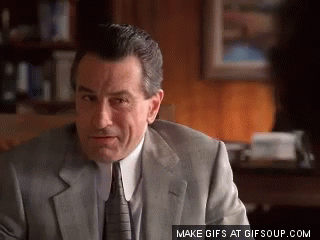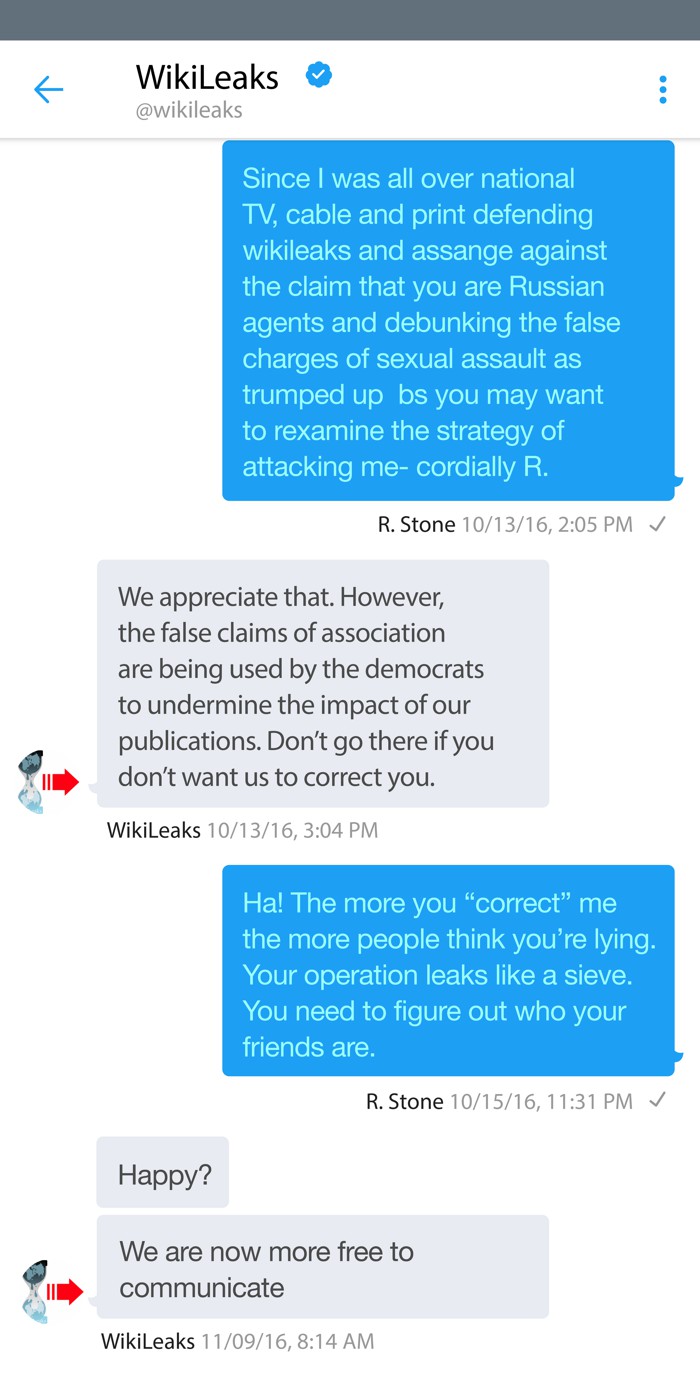SPEAKING OF THE DEVIL 
Roger Stone's Secret Messages with WikiLeaks
Roger Stone's Secret Messages with WikiLeaks
Transcripts obtained by The Atlantic show Donald Trump's longtime confidante corresponded with the radical-transparency group.
Natasha Bertrand4:33 PM ET
On March 17, 2017, WikiLeaks tweeted that it had never communicated with Roger Stone, a longtime confidante and informal adviser to President Donald Trump. In his interview with the House Intelligence Committee last September, Stone, who testified under oath, told lawmakers that he had communicated with WikiLeaks via an “intermediary,” whom he identified only as a “journalist.” He declined to reveal that person’s identity to the committee, he told reporters later.
Private Twitter messages obtained by The Atlantic show that Stone and WikiLeaks, a radical-transparency group, communicated directly on October 13, 2016—and that WikiLeaks sought to keep its channel to Stone open after Trump won the election. The existence of the secret correspondence marks yet another strange twist in the White House’s rapidly swelling Russia scandal. Stone and Trump have been friends for decades, which raises key questions about what the president knew about Stone’s interactions with Wikileaks during the campaign. The White House did not immediately respond to a request for comment.
The depth of Stone’s relationship with WikiLeaks and Julian Assange has been closely scrutinized by congressional investigators examining whether Trump associates coordinated with Russia—or anyone serving as a cut-out for Moscow—to damage Hillary Clinton’s candidacy.
Stone confirmed the authenticity of the messages, but called them “ridiculously out of context” and “a paste up.” He said that he provided the complete exchange to the House Intelligence Committee, but did not immediately respond to a request to provide his own record of the conversation to
The Atlantic.
A screenshot of the exchange, which has not been previously reported, was provided to the House Intelligence Committee last year by a third-party source. The private messages confirm that Stone considered himself a “friend” of WikiLeaks, which was branded a “non-state hostile intelligence service” by CIA Director Mike Pompeo last April. Stone insisted that the messages vindicated his account. “They prove conclusively that I had no advance knowledge of content or source of WikiLeaks publications,” he said. “I merely had confirmed Assange’s public claim that he had information on Hillary Clinton and he would publish it.” He also narrowed the scope of his earlier denials, saying that he’d only denied having communicated directly with Assange, not with Wikileaks. Wikileaks did not immediately respond to a request for comment.
These messages have been reproduced by
The Atlantic’s art team.
“I have never said or written that I had any direct communication with Julian Assange and have always clarified in numerous interviews and speeches that my communication with WikiLeaks was through the aforementioned journalist,” Stone told the committee in
his prepared statement in September. The full hearing was held behind closed doors and the transcript has not been made public. At least one lawmaker had already obtained a screenshot of the exchange before Stone testified, according to two sources familiar with the matter who requested anonymity to discuss the ongoing investigation.
The correspondence raises questions about whether Stone—who served as Trump’s lobbyist in Washington in the late 1990s and early 2000s, and had been encouraging him to run for president for over a decade—has kept secret any interactions that may be of interest to congressional investigators examining Russia’s election interference.
Stone also exchanged private Twitter messages in August and September of 2016 with a user known as Guccifer 2.0. Guccifer claimed in a posting on their Wordpress site to have “penetrated Hillary Clinton’s and other Democrats’ mail servers,” but the self-described hacker was later characterized by U.S. officials as a front for Russian military intelligence. Stone only published that exchange after it was revealed by The Smoking Gun, a website that publishes mugshots and other public documents.
On the afternoon of October 13, 2016, Stone sent WikiLeaks a private Twitter message. “Since I was all over national TV, cable and print defending wikileaks and assange against the claim that you are Russian agents and debunking the false charges of sexual assault as trumped up bs you may want to rexamine the strategy of attacking me- cordially R.”
WikiLeaks—whose Twitter account is run “by a rotating staff,”
according to Assange—replied an hour later: “We appreciate that. However, the false claims of association are being used by the democrats to undermine the impact of our publications. Don’t go there if you don’t want us to correct you.”
“Ha!” Stone responded on October 15. “The more you ‘correct’ me the more people think you’re lying. Your operation leaks like a sieve. You need to figure out who your friends are.” Assange’s internet connection
was cut off days later by the Ecuadorian embassy—which granted him diplomatic asylum in London in 2012—following WikiLeaks’ release of emails that had been stolen by Russian hackers from Hillary Clinton campaign chairman John Podesta’s inbox. The morning after Donald Trump won the election, however, WikiLeaks sent Stone another message. “Happy? We are now more free to communicate.”
It is unclear whether Stone and WikiLeaks kept in touch, using Twitter or another platform, after the election. WikiLeaks continued to insist
through at least last March that neither the organization nor Assange had ever communicated with Stone directly. Stone later identified
radio host Randy Credico as the intermediary, but Credico denied that in an interview
with The Daily Beast earlier this month. “There was no backchannel to Roger Stone, and I think that his testimony was a lot of bravado,” Credico said. “Roger’s a showman.”
The substance of the messages does seem to corroborate, however, Stone and WikiLeaks’ denials prior to October 13 that they had coordinated in any significant way. WikiLeaks indicated that Stone’s claims of association—even if through a backchannel, as Stone alleged—were false. But the screenshots do not show whether Stone and WikiLeaks communicated prior to October 13 or after November 9, 2016.
Democrats have asked GOP members to subpoena Twitter for the private messages of Trump associates currently under investigation in the Russia probe, according to one of the sources familiar with the internal proceedings. But the majority has so far refused. Mike Conaway, the Texas Republican who is leading the Intelligence Committee's investigation, did not immediately respond to a request for comment. As
The Atlantic’s Julia Ioffe
first disclosed last fall, WikiLeaks also exchanged private Twitter messages with Donald Trump Jr., who provided the correspondence to congressional investigators. WikiLeaks continued to message Trump Jr. through July 2017,
“actively soliciting” his cooperation on ventures ranging from obtaining the president’s tax returns to appointing Assange Australia’s U.S. ambassador.
On July 22, 2016, just before the Democratic National Convention kicked off, WikiLeaks published thousands of emails that had been stolen from Democratic National Committee servers by hackers the U.S. intelligence community has since linked back to Russia. Stone told the
Southwest Broward Republican Organization on August 8 that he had “communicated with Assange” and believed that “the next tranche of his documents”—which Assange
had hinted at in an earlier interview with CNN— pertained to the Clinton Foundation. Stone soon walked that back, claiming instead that he communicated with Assange
via an intermediary who he identified last November as Randy Credico. He declined to identify the intermediary in his interview with the House Intelligence Committee, but later changed his mind and claimed it had been Credico.
On October 4, 2016, Assange
held a press conference to mark WikiLeaks’s 10th anniversary. The event had been hyped by supporters of then-candidate Trump, including Stone, as an “October surprise” that would completely derail Clinton’s presidential campaign just over a month before the election. On October 2, Stone told the far-right talk-radio host Alex Jones that he had been “assured that the mother lode” was coming. The next day, he tweeted that he had “total confidence that @wikileaks” and his “hero Julian Assange” would come through.
At his press conference, however, Assange gave no hints of what was to come, leaving his fans, and many of Trump’s, disappointed. Still, Stone was not deterred. “Libs thinking Assange will stand down are wishful thinking. Payload coming #Lockthemup,” he tweeted on October 5, 2016.
The payload actually came two days later: WikiLeaks began publishing the contents of Podesta’s inbox, which had been infiltrated by Russian hackers seven months earlier. Stone told
The Daily Caller on October 12 that Assange had delayed the email dump on purpose: “I was led to believe that there would be a major release on a previous Wednesday,” he said. He denied, however, that he had been given “advance knowledge of the details” and maintained that he was only in touch with Assange “through an intermediary.”
On the morning of October 13, WikiLeaks
issued a clarification: “WikiLeaks has never communicated with Roger Stone as we have previously, repeatedly stated.” It was later that day when Stone confronted WikiLeaks in a private message, and accused the organization of “attacking” him. WikiLeaks did not seem phased by the confrontation, and re-opened its line of communication with Stone on November 9. Fourteen months later, Stone visited the Ecuadorian embassy in London, where Assange has been holed up for more than five years.
“I didn’t go and see” Assange, Stone told
The Daily Beast last month. “I dropped off a card to be a smart ass.”
Kevin Lamarque / Reuters
@DonKnock @dza @88m3 @wire28 @smitty22 @fact @Hood Critic @ExodusNirvana @Blessed Is the Man @dtownreppin214 @JKFrazier @tmonster @BigMoneyGrip @Soymuscle Mike @.r. @Dorian Breh @Dameon Farrow @TheNig @VR Tripper @re'up @Blackfyre_Berserker @Cali_livin












